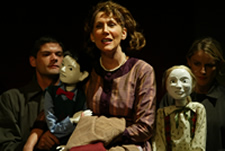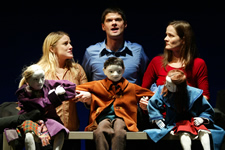 Car
Trouble
Car
Trouble
By Alexis Greene
The Long Christmas Ride Home
By Paula Vogel
Vineyard Theatre
108 E. 15th St.
Box office: (212) 353-0303
The last new plays by Paula Vogel to receive
major New York productions were The Mineola Twins and
How I Learned to Drive. The first was a rambunctious
feminist satire, the second, which won a Pulitzer Prize, a poignant
drama of mingled love and sexual abuse.
Now Off-Broadway's Vineyard Theatre has
produced Vogel's latest work, The Long Christmas Ride Home.
But unlike the others it feels transitional, unfinished, as though
Vogel were working out themes and characters that will appear
more fully in another script, as yet unimagined. While alluding
to Thornton Wilder's one-acts--The Happy Journey to Trenton
and Camden and The Long Christmas Dinner--and filled
with references to Asian theatre, The Long Christmas Ride
Home is at bottom simply a partially formed American family
drama. Possibly autobiographical, it lacks the emotional force
that autobiography, and drama, should possess.
Like Wilder's The Happy Journey,
Vogel's Long Christmas Ride Home involves a family automobile
trip. But Wilder stresses the supposed icons of the American family
experience: unity, motherhood, children's moral upbringing. The
one wrenching emotional incident, which occurs between the mother
and her son, is apparently resolved.
By contrast, Vogel portrays a journey rife
with anxiety and poisonous private thoughts. The father (Mark
Blum) would rather be with his mistress than his wife (Randy Graff)
or his three children, the youngest of whom, Stephen (Will McCormack),
threatens to be carsick in the back seat. Christmas dinner with
the mother's parents explodes in physical violence, as does the
ride home. Momentary peace arrives only during a strange Unitarian
church service, when the minister (Sean Palmer) shows slides from
his recent trip to Japan, and unhappy Stephen absorbs their beauty
and eroticism.
No one really recovers from that horrible
car ride, Vogel's play tries to demonstrate. Stephen and his sisters,
Rebecca (Catherine Kellner) and Claire (Enid Graham), grow up
and enter unfulfilling, sometimes abusive relationships that are
no better than their parents' marriage. The women behave self-destructively.
Stephen contracts HIV and dies. But though she tries hard, Vogel
never makes the children's grown-up lives as dramatic, or even
as intriguing, as that never-to-be-forgotten Christmas journey.
Vogel filters her play through the prism
of Japanese puppet theatre. During the car ride, the three children
are represented by large puppets, the marvelous creations of Basil
Twist. Bundled in winter coats and hats, the puppets perch on
a high bench and are manipulated expressively by the three adult
actors, who stand behind their charges and are aided, in the manner
of Bunraku, by black-garbed puppeteers. In the style of much classical
Asian theatre, a character often speaks another's thoughts. The
father, sitting to one side, mimes shifting gears and at the same
time voices the thoughts of his wife and his children. Both parents
frequently refer to themselves in the third person. Only later
in the play, when the children grow up, and the adult actors perform
without puppets, do Stephen, Rebecca and Claire vent their own
feelings.
Perhaps Vogel superimposes the techniques
of Asian theatre to give a twist to the American family drama,
which for decades has been unrelentingly realistic. In most of
her plays Vogel has toyed with dramatic form. In works like The
Baltimore Waltz, And Baby Makes Seven, and How I Learned
to Drive, she consciously veers away from the connective
psychological tissue that realistic writing allows. She asks us
to fill the interstices of her writing and make our own connections.

But in The Long Christmas Ride Home
Vogel puts us in a quandary. Form overpowers content. What, really,
are we to make of this superimposed, pseudo-Asian style, except
that it camouflages the play's weaknesses? What, after all, are
we to make of these three children when grown, each standing outside
a lover's door or beneath a window, spurned and angry? To be sure,
childhood incidents can permanently traumatize us. But when they
become adults, Stephen, Rebecca and Claire move us little. As
in Baltimore Waltz, Vogel again seems to be writing about
her beloved brother, who died of AIDS in 1988, but the Stephen
we see here is a shadow of the human being in the earlier play.
Here he is only someone who, when rejected by his much younger
boyfriend, runs to a gay bar and hurls himself into ferocious,
unsafe sex. The play essentially begins and ends during that horrific
Christmas ride. The aftermath--whatever it truly was--remains
untapped and unshaped.
Mark Brokaw, who directed How I Learned
to Drive with such sensitivity and precision, brings the
same eye for detail and nuance to The Long Christmas Ride
Home. Vogel could not ask for a more exquisite production.
From Basil Twist's puppets and Neil Patel's spare design (a stage
of light-colored wooden flooring and wooden beams) to Mark McCullough's
crystalline lighting, Jess Goldstein's costumes and David Van
Tieghem's tinkling, percussive music, Brokaw has fashioned an
elegant presentation. From the actors, especially Graff as the
mother, he has drawn three-dimensional performances where dimensionality
was not written. If at times the acting hits certain moments too
hard, it is only that the actors have run up against Vogel's cumbersome
style and, like this struggling play itself, found no way around
it.
